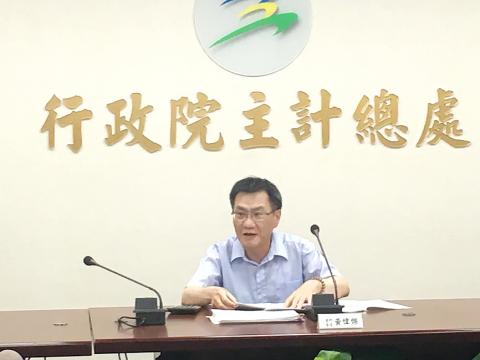The nation’s economy last quarter expanded 2.41 percent annually, beating the government’s May estimate of 1.78 percent on the back of better-than-expected private investment and exports, the Directorate-General of Budget, Accounting and Statistics (DGBAS) said yesterday.
“Exports and private investment fared stronger than our expectations, thanks to order transfers and capital repatriation,” DGBAS Senior Executive Officer Huang Wei-jie (黃偉傑) told a media briefing in Taipei.
External demand contributed 0.72 percentage points to GDP growth during the April-to-June period, versus a drag three months earlier, as the decline in exports tapered to 2.58 percent. The agency had forecast a 3.43 percent decline.

Photo: Cheng Chi-fang, Taipei Times
Demand for semiconductors and electronics, the mainstay of Taiwanese exports, started to pick up, although most other categories continued to disappoint, Huang said.
As several firms have shifted part of their manufacturing capacity back home amid a trade dispute between China and the US, exports of information and communications products increased 20.15 percent, the agency said.
Exports are likely to gain more momentum after returning to growth in June, thanks to the arrival of a peak season for technology products, the Ministry of Finance said last month.
Major technology firms gave positive guidance in recent earnings conferences, but were wary of headwinds at home and abroad.
Exports of goods and services would grow 4.11 percent annually if excluding a price decline of 5.57 percent in US dollar terms, Huang said.
Capital formation proved the biggest growth driver with a 6.04 percent increase from a year earlier, contributing 1.23 percentage points to GDP growth, the agency said.
The showing beat the agency’s May forecast of a 5.3 percent gain.
“The pace of capital repatriation is much faster than the government’s expectations,” Huang said.
Imports of capital equipment rose 15.95 percent in US dollar terms, as firms raised capital expenditure to maintain technology leadership and seize 5G business opportunities, DGBAS said.
Consumer spending rose 1.57 percent, slower than a projection of 1.76 percent, the agency said.
Meanwhile, daily stock turnover shrank 21.17 percent from a year earlier, subduing the benefits of modest growth in retail, wholesale and dining businesses, it said.
Washington’s tariff hikes on Chinese goods in May unnerved investors, but the sentiment has recovered considerably after the two sides agreed on a truce in June and resumed trade negotiations this week.
In the first two quarters, Taiwan’s economy grew 2.07 percent and is expected to continue growing in the coming quarters.
The agency is to announce its new growth forecast on Aug. 16.

CHIP WAR: Tariffs on Taiwanese chips would prompt companies to move their factories, but not necessarily to the US, unleashing a ‘global cross-sector tariff war’ US President Donald Trump would “shoot himself in the foot” if he follows through on his recent pledge to impose higher tariffs on Taiwanese and other foreign semiconductors entering the US, analysts said. Trump’s plans to raise tariffs on chips manufactured in Taiwan to as high as 100 percent would backfire, macroeconomist Henry Wu (吳嘉隆) said. He would “shoot himself in the foot,” Wu said on Saturday, as such economic measures would lead Taiwanese chip suppliers to pass on additional costs to their US clients and consumers, and ultimately cause another wave of inflation. Trump has claimed that Taiwan took up to

A start-up in Mexico is trying to help get a handle on one coastal city’s plastic waste problem by converting it into gasoline, diesel and other fuels. With less than 10 percent of the world’s plastics being recycled, Petgas’ idea is that rather than letting discarded plastic become waste, it can become productive again as fuel. Petgas developed a machine in the port city of Boca del Rio that uses pyrolysis, a thermodynamic process that heats plastics in the absence of oxygen, breaking it down to produce gasoline, diesel, kerosene, paraffin and coke. Petgas chief technology officer Carlos Parraguirre Diaz said that in

Japan intends to closely monitor the impact on its currency of US President Donald Trump’s new tariffs and is worried about the international fallout from the trade imposts, Japanese Minister of Finance Katsunobu Kato said. “We need to carefully see how the exchange rate and other factors will be affected and what form US monetary policy will take in the future,” Kato said yesterday in an interview with Fuji Television. Japan is very concerned about how the tariffs might impact the global economy, he added. Kato spoke as nations and firms brace for potential repercussions after Trump unleashed the first salvo of

SUPPORT: The government said it would help firms deal with supply disruptions, after Trump signed orders imposing tariffs of 25 percent on imports from Canada and Mexico The government pledged to help companies with operations in Mexico, such as iPhone assembler Hon Hai Precision Industry Co (鴻海精密), also known as Foxconn Technology Group (富士康科技集團), shift production lines and investment if needed to deal with higher US tariffs. The Ministry of Economic Affairs yesterday announced measures to help local firms cope with the US tariff increases on Canada, Mexico, China and other potential areas. The ministry said that it would establish an investment and trade service center in the US to help Taiwanese firms assess the investment environment in different US states, plan supply chain relocation strategies and